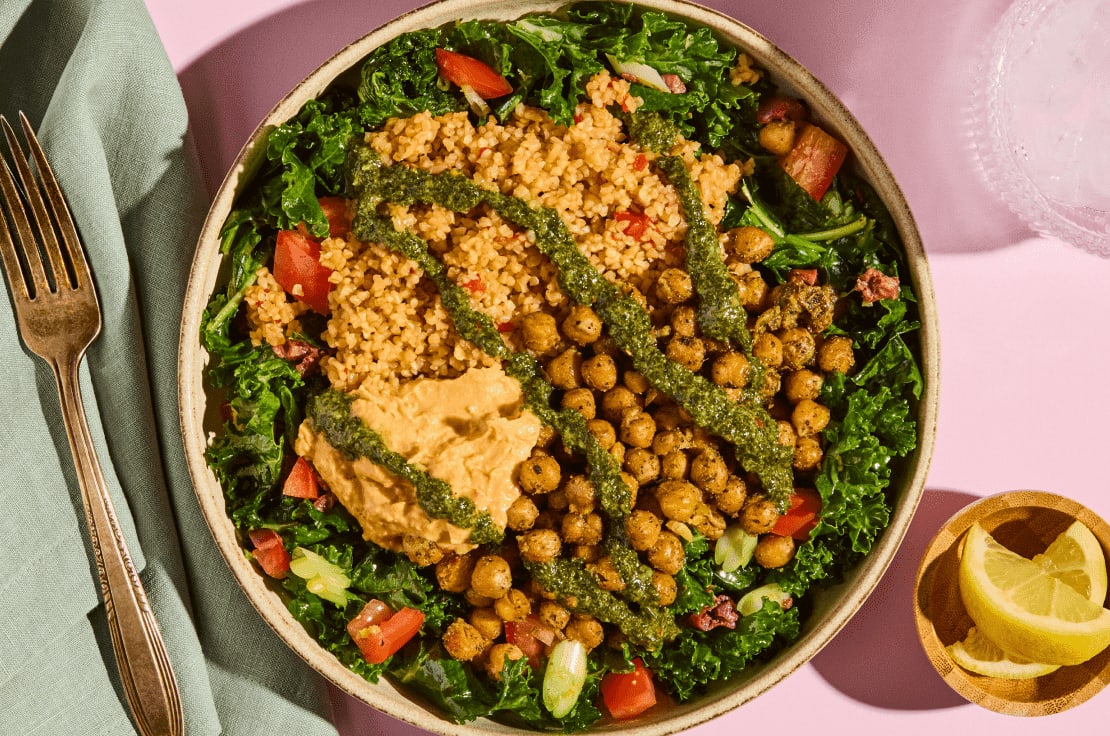BRAIN & GUT HEALTH
BRAIN & GUT HEALTH

Eating for Brain Health
Inspired by the MIND diet, a science-backed eating pattern for brain health, our Brain Health recipes contribute a variety of antioxidants and essential nutrients provided by leafy green vegetables, nuts, legumes, and/or proteins to support brain health.¹
Per serving, these recipes provide less than 35% daily total calories for those following a standard 2,000 calorie diet, while always delivering more than 60% DV of protein per serving.
The 2020–2025 Dietary Guidelines for Americans report emphasized limiting red and highly-processed meats.² Our Brain Health recipes contain no beef or highly-processed meats, so they may help you limit consumption of foods like bacon, sausage, and deli meats.

Eating for Gut Health
Our Gut Health recipes emphasize plant-based and fiber-rich foods such as leafy greens, fruits, nuts, legumes, and/or whole grains—all of which support a healthy gut biome. These recipes also provide a minimum of 10g of fiber, which delivers at least 35% DV of fiber per serving.WHY IS FIBER SO IMPORTANT TO A HEALTHY EATING PATTERN?
THE MEDITERRANEAN DIET
THE MEDITERRANEAN DIET

Our Approach to the
Mediterranean Diet
Our Mediterranean recipes are thoughtfully developed with health in mind. In addition to cuisine-type, this collection is conscious of calories, saturated fat, and sodium per serving.
These recipes are inspired by traditional Mediterranean ingredients and flavors, specifically highlighting cuisines from Italy, Greece, Spain, France, and Morocco.
You’ll find that each recipe intentionally calls for the use of olive oil.Olive oil contains polyphenols, antioxidants, and most importantly, oleic acid .
Oleic acid (a monounsaturated fatty acid) is considered a heart healthy fat. When used as a replacement for fats and oils with higher saturated fat content, it may lower the risk of coronary heart disease.⁶ ⁷
REFERENCES
¹ Harvard T.H. Chan School of Public Health. (n.d.). MIND Diet. The Nutrition Source. https://www.hsph.harvard.edu/nutritionsource/healthy-weight/diet-reviews/mind-diet/.
² U.S. Department of Agriculture and U.S. Department of Health and Human Services. Dietary Guidelines for Americans, 2020-2025. 9th Edition. December 2020. Available at DietaryGuidelines.gov.
³ Quagliania, D., Felt-Gunderson, P. (2017). Closing America’s Fiber Intake Gap. American Journal of Lifestyle Medicine, 11(1), 80-85. https://www.ncbi.nlm.nih.gov/pmc/articles/PMC6124841/.
⁴ Peregrin, T. (2013). The Inside Tract: What RDs Need to Know about the Gut Microbiome. Journal of Academy of Nutrition and Dietetics, 113(8), 1021-1023. https://www.jandonline.org/article/S2212-2672(13)00643-6/.
⁵ Advisory. (2023, January 3). Best Diets for 2023. https://www.advisory.com/daily-briefing/2023/01/03/best-diets.
⁶ Jiminez-Lopez, C., Carpena, M., Lourenco-Lopes, C., Gallardo-Gomez, M., Lorenzo, J.M., Barba, F.J., Prieto, M.A., Simal-Gandara, J. (2020). Bioactive Compounds and Quality of Extra Virgin Olive Oil. Foods, 9(8), 1014. https://www.mdpi.com/2304-8158/9/8/1014.
⁷ U.S. Food and Drug Administration. (2018). FDA Completes Review of Qualified Health Claim Petition for Oleic Acid and Risk of Coronary Heart Disease. U.S. Food and Drug Administration. https://www.fda.gov/food/cfsan-constituent-updates/fda-completes-review-qualified-health-claim-petition-oleic-acid-and-risk-coronary-heart-disease.